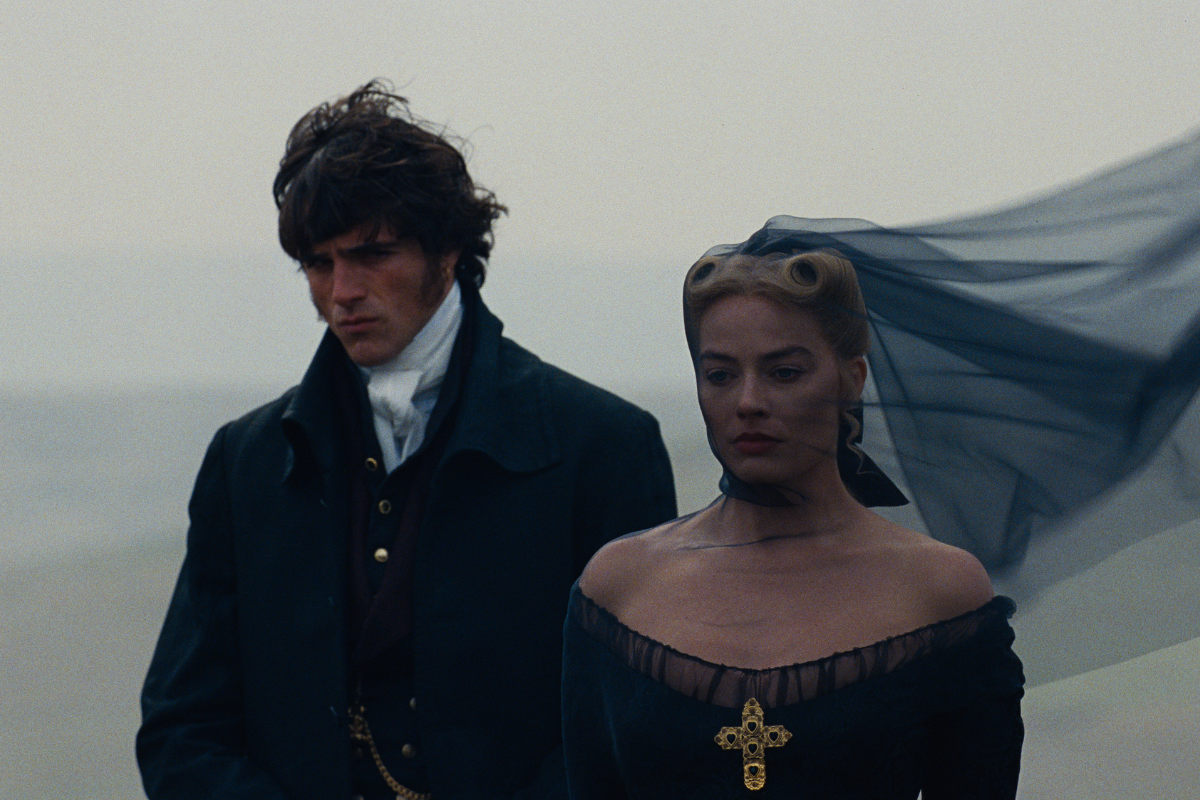“AND THE EXPERT IS….” – Robert Osborne Talks Oscar
The Academy’s historian and host of Turner Classic Movies, Robert Osborne, lends insight into the selection of best screenplay winners, past and present.
Originally published in Script magazine January/February 2008
Bob Verini is the Los Angeles-based theater critic for Daily Variety, for whom he also contributes features on film, theater and television. Since 2000 he has been a senior writer for Script. Twitter: @BobVerini
Editor's Note: With the passing of Robert Osborne, we wanted to bring back an archived interview Bob Verini conducted with Robert back in 2007. It's full of wonderful insights, plus who wouldn't love a conversation between two amazing lovers of the Oscars. Enjoy!
On April 14, 1994 – a date deliberately chosen as the 100th anniversary of the first public showing of a motion picture in New York City – the viewing and appreciation of the greatest films of all time changed forever.
That was the first time the courtly, dapper Robert Osborne strolled onto a living room set to anchor Turner Classic Movies: great films offered 24/7 and commercial-free, with prefatory comments and final words by the Hollywood Reporter columnist and author, a 50-year observer of the Hollywood scene.
Not coincidentally, Osborne – who got into journalism in the 1950s when Lucille Ball told a young actor that he ought to turn to writing full-time, and became his friend and champion for life – is also America’s premier Oscar watcher, the author of 75 Years of the Oscar, the officially commissioned Academy history. (“It’s pretty heavy now,” he concedes. “You don’t have to join a gymnasium if you’re reading it.”)
Even casual TCM viewers know that Osborne has a keen appreciation of writing talent, drawing Script to talk with him at length about Oscar’s off-and-on love affair with the Writers Branch.
He sees several factors at the heart of the world’s enduring fascination with the Academy Awards. “It has become the epitome of an award, the worldwide symbol for the best and one that’s been around forever. Everybody loves movies, and what’s the one prize you can get for the movies? The Oscar – that’s why nobody would dare give a prize for movies in the year after the Oscar. It’s the final say.”
Moreover, he argues that the prize is “one reason we have as many good movies as we do have, because I think people aim for an Academy Award. If they didn’t they’d just be making Evan Almighty or whatever, just to make money. The Oscar is the lure for people to do really good work and be recognized for it. And it’s associated with the great legends of the past – Bogart, Bette Davis, Clark Gable, Katharine Hepburn and so many others have won.
“Michael Caine once told me in an interview (years before he won) that ‘More than anything else, I want to win an Oscar.’ I asked him why. ‘Because that puts you in a fraternity unlike any other for an actor. I want to be in that fraternity.’”
I wonder whether you would say the reasoning of the Writers Branch is on par with the Academy’s selections, or ahead of them.
Where it gets complicated in the whole Oscar process is that you’ve got really astute pros in a certain field making the nominations in that field. But once the voting starts, you’ve got actors judging sound recording, you’ve got cinematographers judging scripts – people who aren’t maybe as knowledgeable, so it becomes more of a popular vote: “Oh, I love that movie An Affair to Remember, let’s vote for that.”
I think the selections the writers have made in the Oscar process have always been really good. And it’s interesting, because they’re not necessarily popular choices all the time. There’s always one or two outside films that’ll pop up and you think, “Isn’t it interesting they picked that.” But they don’t always win because again, it’s the popular vote that makes the final selection.
One year that speaks very much to what you’ve been saying is 1947. Among the writing nominees you had Shoeshine and Monsieur Verdoux and Body and Soul. And don’t get me wrong, I love The Bachelor and the Bobby-Soxer, I watch it every time you play it, but....
That’s a perfect example. That’s a popular vote. And in that same year for Best Original Story, you’ve also got a French film, A Cage of Nightingales, but what won was Miracle on 34th Street. (Not to say it wasn’t a wonderful movie.) Take 1950: You’ve got Bitter Rice, an Italian film; The Gunfighter, which is great but was never popular; Mystery Street, a wonderful little MGM B-picture; When Willie Comes Marching Home, which is a John Ford picture that nobody saw – although Lucille Ball always said it was her favorite movie of all time. But these all got nominated. [The winner was the most popular film of the bunch, Panic in the Streets.]
And 1952, I have to say, really shows what I’m talking about. Motion Picture Story: The winner was The Greatest Show on Earth, which I think is a terrific movie, a great history of the Big Top, but the story is kitsch at its kitschiest. It’s not a great story; it’s hokum. [And up against it] you’ve got The Narrow Margin, which has turned out to be one of the great film noir classics; The Sniper, another little movie that was terrific; Pride of St. Louis, which I remember was good; and My Son John, a wonderful story with Helen Hayes and Robert Walker about a woman who discovers her son is a Communist. But what wins? Of course, the most popular film of the year.
So again, the Academy nominators do a very good job, but the final voting can be a little bit suspicious.
The Academy took a long time to get the categories worked out.
They did. That’s one thing I’ve always respected about the Academy, they’re not rigid. They’re not quick to make changes, but they do make them. In the first year there was no sound so there was a Title Writing award, but when sound came in the categories changed. When color started taking over the industry, and as many films were made in color as black-and-white, they cut cinematography and costume design into two categories; and then when everything was in color they went back to one category again. It took them seven years before they started giving music awards, and a long time before costume design awards were made. But they have been adaptable and I think that’s one of the strengths of the Academy. It took a while, but they finally sorted out the distinction between adapted and original.
There were some very prestigious winners in those early years: The Informer; The Scoundrel, for Noel Coward; George Bernard Shaw for Pygmalion – I wonder whether he ever accepted his Oscar.
He actually did. There was a photograph of Vivien Leigh handing him an Oscar, but that was years later. At the time, he was quoted as saying that it was an insult – that his was the “only” film that year! “How dare you put me in with other films!” Rascal to the end.
When we get into the wartime era, the single biggest name in Oscar’s annals is Billy Wilder. Certainly he was a genius, but is there anything we don’t know about him, about why Oscar liked him so much?
I think it’s simple: His were great films. Not only did he have humor, but he also made one of the great film noir stories, Double Indemnity. He was so talented as a director and writer; he did everything. And he had taste, a classy guy. He was a disciple of Lubitsch – and that’s a whole story in itself, what we got from Germany when the Nazis came to power, all those great German artists who came over because so many were Jewish or on the Left.
He was also a great self-promoter, aware that you’ve got to make some noise so people know you’re there. So he was always conspicuous, which goes with the movie industry. He was funny, too. I was only around him a little bit, but he was always funny. This might not translate well, but there was a time when Ernest Borgnine was married to Katy Jurado, the actress from High Noon. Billy was walking down the street with friends past a storefront that read KARATE JUDO, and he said “Oh, I loved her when she was married to Ernie Borgnine.” He was so quick, everyone wanted to be around him. He was a player, and that’s important in Hollywood. But he had the talent to back it up.
Speaking of the war and wartime tastes, I was looking over that era’s winners, and almost all of them had a wartime theme. Even Going My Way had a war subplot. And yet almost all of them dealt with the home front, the big exception of course being Casablanca. There were a lot of war movie scripts nominated, but the winners dealt with the home front. What do you make of that?
Well, let’s look at the lists.... [He pauses to riffle through his book.] That is interesting. In 1944, for Screenplay you have Double Indemnity, Gaslight, Laura and Meet Me in St.Louis. Going My Way, the winner, is the only one that has anything to do with war. And around those years, yes, you’ve got Lifeboat, The Sullivans, None Shall Escape, Hail the Conquering Hero, Two Girls and a Sailor (how’d that ever get in?), Wing and a Prayer....well, that has to be simply because that’s what everybody was thinking about at that time. I mean, the great Paramount picture of 1944 was not Going My Way, it was Double Indemnity, which was popular but not the smash Going was. In the time of war, when your hometown people have left and relatives are killed or dying, you’re going to be terribly affected by a story of a kindly priest with a sense of humor when you go to the movies, not a pair of killers trying to murder somebody’s husband. I just think the mood of the time has to do with those selections.
So there’s something a little zeitgeisty about Oscar.
That’s what I try to encourage when people are watching TCM, to put yourself in the position of the time the film was made. One of the great examples was the 1942 winner for screenplay and Best Picture, Mrs. Miniver. I think it’s a really good movie, but what makes it a really powerful movie is if you put yourself in the position of what people were really going through in their lives at the time. We’d just been plunged into a war; people were scared about that, thought we’d be invaded and that life was going to become terrible. It was President Roosevelt who saw the film and told MGM, “You must release this as soon as you can.” It became this powerful propaganda agent which (and Roosevelt said so) was very much responsible for the country coming together in the early part of the war. Because here you have a story about a British family going through the Blitz and the war, and the mother still cares about a flower show and a new hat she wants to buy, and the dad still lusts after the new car he wants. It told audiences, “Yes, we’re worn out, but we still have families; life still goes on. We have to be courageous and make sacrifices, but it doesn’t mean that everything changes.”
If you see the movie today, you say, “Well, this is o.k. but not powerful,” but in 1942 it was terribly powerful – a great teacher for everybody, much taken to everybody’s heart and much loved. So with that hit in the stomach that it gave people at the time, it’s certainly going to outrank The Pride of the Yankees, which was a wonderful movie and still is today, or Random Harvest (one of my favorites) or Talk of the Town.
We’ve already talked about seeing some foreign films among the nominees in the postwar years. Maybe it’s not too much of a stretch to say that the filmmakers who came back from overseas had seen the world; America had seen the world at least through the press and newsreels, and wanted to have that represented on screen somewhat.
That’s right. After the war they could be a little more realistic about what the war was like. You couldn’t really go into that during the war, because number one, you wanted escapism entertainment, Betty Grable and all that; a lot of films in which the war isn’t even mentioned so people can go to the movies and get away from it. And also, you couldn’t really criticize the government or how awful war was. It had to be won, and you had to see it as tough but heroic because of the kids over there fighting. But after the war you could be more realistic: You have [Oscar-nominated] Pride of the Marines, with John Garfield as a G.I. who comes back blinded, trying to adjust. Or the power of The Best Years of Our Lives, the soldier with no hands and his adjustment to life. When the war ended and everything was o.k. except the threat of Communism, then you could get into rougher themes and even be a little more negative, and still be embraced by the public.
And some wonderful choices, from Lost Weekend to From Here to Eternity, and even Marty, something that had actually come from television, for pete’s sake. But that gets us into the blacklist period: not the Academy’s finest hour, would you say?
No, it wasn’t, but they certainly have done their best to make it up to those who affected. Again, it’s so hard to judge if you weren’t there. I wasn’t there, but a friend of mine, Barbara Rush, an actress starting out at Paramount in the 50’s, said “You had to be really careful of whom you even sat with in the commissary, because if there was any tinge of controversy about them, you could lose your contract, your career could be over.” Everybody was running so frightened; there were so many of those rabble-rousers scaring everybody that there was a Commie behind every tree. So again, it wasn’t their finest hour, but the Academy was protecting itself. They didn’t know how much of a threat all that was. They have, in the years since, gone back and made good – changed all the Academy records so that the names of the fronts were taken off and the real names put back on, and Oscars or certificates given to the person or family of the person. They’ve made a concerted effort to do that.
Giving Michael Wilson and Carl Foreman their writing Oscars for Bridge on the River Kwai...
And Dalton Trumbo, for that story he wrote under a pseudonym, The Brave One. Yes, it was a very unattractive period, but I don’t blame the Academy for that. It was unattractive from all quarters.
It’s interesting that around the time when the blacklist broke, the writing nominees and winners start to become even edgier than before. In 1960 you have Dalton Trumbo credited for Spartacus and Exodus, and then one year later you’ve got Splendor in the Grass and Judgment at Nuremberg winning. The Apartment a year before; Divorce—Italian Style and To Kill a Mockingbird a year later: These are really grown-up movies. It’s a little pat to say “blacklist ended, then boom, adult films,” but....
Well, at the time of the blacklist, the late 40’s and early 50’s when the most damage was done, television was coming in. One of the reasons for being bold wasn’t just that they could be bolder, but they were trying to use themes that would pull people into the theaters, things that wouldn’t be done on television in those days. Nowadays you can say almost anything on TV, but it was so pure in those days, so many restrictions because it was going into people’s homes. When television came along and started eating up the movie audience, the moviemakers started having to be bolder, to do like the Europeans were doing to get people into the theater. People were looking for something sassier, sexier, more provocative because they were tired of the same old pablum they were getting on television at the time. They also did it by making the screen wider and bigger, of course; 3-D for a while.
I remember going to see Who’s Afraid of Virginia Woolf? in 1966 at the Pantages in Hollywood, and they had cops checking ID’s for those who were under 18! But it was films like that causing people to line up. They weren’t just going to see Elizabeth Taylor and Richard Burton. They were going to see real people, with strong language and all of that.
That introduced a Golden Age, as some would have it.
Well, if you look through my Oscar book, you see the high points of everything. I remember the 70’s and much of 80’s as being a really lousy time for going to the movies. A few things would stand out, and they’re the ones that get on the Oscar list. But there was an awful lot of crap being made during those periods – all those awful movies with Elliott Gould and Donald Sutherland. And Beyond the Valley of the Dolls, which opened the same day as Myra Breckinridge. And all those awful movies Candice Bergen made – The Day the Fish Came Out. It’s a wonder the industry survived! You shudder to remember those pictures, but now all that’s left is the cream rising to the top.
Today Oscar is big business, and small films have as much of a chance, even more of a chance some years, than the big-budget ones. What accounts for that?
Back in the ‘50s, Academy voters, like everyone else, went to see the popular films. Everybody went to see The Greatest Show on Earth and the popular movies, but they didn’t always seek out The Narrow Margin or Monsieur Verdoux. And in order to get someone to vote for your Oscar, you’ve got to get them to see your movie. But now Academy voters in Los Angeles don’t have to get in their car, go to a theater and find a time to see The Crying Game. They see everything now. Once the DVD’s came into it, voters, like the public, could see these smaller films much more easily than they could at that earlier time.
Even before VCR’s came in, if you lived in Los Angeles you’d see the famous Z Channel in Los Angeles – the first cable station to run films uninterrupted – and for a period of time you could see all the nominees there. That started getting more films seen by more Academy voters.
So, popularity figured in in terms of accessibility as much as anything else.
Making possible more offbeat choices now, like Fargo.
Oh, there’s no way Fargo would’ve won the awards it did, at an earlier time.
Where do you stand on the Brokeback Mountain/Crash controversy?
I thought Brokeback Mountain was such a great film, so well done and wonderfully acted and directed. Crash was a good film, very interesting, but not a great one by any means. I missed it when it first came out and everybody kept talking about it, so when I was in Paris on a vacation I saw it there, and I thought “This was really good; I’m glad I saw it.” When it was nominated, I was glad that enough people had seen it to get it on the list. It deserved to be. But I was really distraught when it won. I thought that was such a homophobic reaction to a poetic, daring film that said something about people and behavior.
Nowadays it seems as if the writing award is used as a runner-up prize. The Usual Suspects wins for writing but Braveheart wins Best Picture. L.A. Confidential wins for writing but Titanic wins Best Picture. Is that fair, do you think?
Well, I certainly think that any award Titanic won was unfair, except maybe cinematography and special effects. I thought that was such a crappy film. What I was insulted by was that the story of the Titanic is so dramatic in itself, one of the great stories of all time. If you just take the facts of those people on board and their scenarios, you don’t have to write a fictional story about a necklace, and at one point have your hero tied up to a pipe and the woman has to go looking for an axe while Billy Zane is running down the corridor like a villain in an old melodrama ready to tie the girl to the railroad tracks. It all got so ridiculous. But the public obviously loved it, and that was really healthy for the movie industry.
I do think that people are astute enough to realize that maybe L.A. Confidential was not the best picture of the year, but that script was terrific. And that’s not to say it wasn’t the best that year, but you have to have agreement on that sort of thing. Braveheart was another very good script, but it won because of all the elements put together, the production values, acting and directing. That and Titanic were certainly popularity awards. An awful lot of people voted for them.
I’ve always thought that the nominations were the important thing and that they usually get those right – especially now.
I wonder if you could opine on the old cliché about writers being second class citizens – “schmucks with Underwoods,” Jack Warner said.
I’m not sure it was ever quite that way, that they weren’t given respect. You know, writers have always been a pain in the ass, because they’re all kind of grumpy people. They spend so much time alone, they become divas....Here’s an attitude that some writers have, though I think it was somewhat tongue in cheek: When Donald Ogden Stewart got up to accept the Oscar for writing The Philadelphia Story, the whole evening people had been thanking this one and that one, and he got up and said, “I don’t have to thank anybody, because I am solely and totally responsible for the success of this movie,” and he sat down. Everybody of course laughed, because Philip Barry had written it, Katharine Hepburn had spearheaded it, Cary Grant and Jimmy Stewart were in it, George Cukor directed it – but I think it is kind of the way many writers feel.
I don’t think they always have got the attention, but I think now they get so much more respect for what only writers can do. Everybody knows you can’t do anything if you don’t have a story. That’s one of our problems, we have directors who just want to let us see how much they’re directing. But those films are never as successful as those with a strong story.
To wrap up, are there any writing winners that, as you look through your book, you just feel they got wrong – choices that were beyond the pale?
There’s nothing that looms out in my mind. There’d be some nominations, probably. But when I look at those lists, they may not be my choices but I kind of accept them, because they were the choices of the voters. I feel that everybody has a right to their own opinion, and quite often it’s not mine. My favorite actress to see in the movies was Gene Tierney, but I recognize she’s not a great actress. I love watching her on film, but I can understand how someone could say “How can you compare her to Garbo or Ingrid Bergman?” I’d say, “Well, I don’t.”
Again, I think you have to consider the times. I can’t look back and say “Ah, Double Indemnity, that should have won over Going My Way or The Quiet Man should’ve beaten The Greatest Show on Earth.” No, that was what those voters believed at the time. I just don’t look at it as a mistake or not a mistake.
I mean, I disliked the casting of Titanic. Leonardo DiCaprio, when he comes into the salon in his tuxedo, so looks like he belongs there, and yet in the movie everybody gasps because this guy from downstairs is upstairs. Meanwhile, Kate Winslet, who’s upstairs, hulks up and down stairs like a washerwoman. You needed Gwyneth Paltrow and Philip Seymour Hoffman if you wanted to tell that story right. But again, people did love that movie, and they’re allowed to, just as I’m allowed to love Cover Girl more than I love Singin’ in the Rain.
[Pause] Do you really?
No.
Get tips on writing an Oscar-worthy script in Jon James Miller's webinar
Developing the High-Concept Screenplay
Bob Verini is the Los Angeles-based theater critic for Daily Variety, for whom he also contributes features on film, theater and television. Since 2000 he has been a senior writer for Script Magazine, also their resident go-to guy for all things Oscar related, and a frequent moderator of live screening talkback sessions and podcast Q&As on industry topics. By day, Bob is an academic director and teacher for Kaplan Test Prep and Admissions, welcoming your questions on standardized tests and stress management issues. Twitter: @BobVerini







